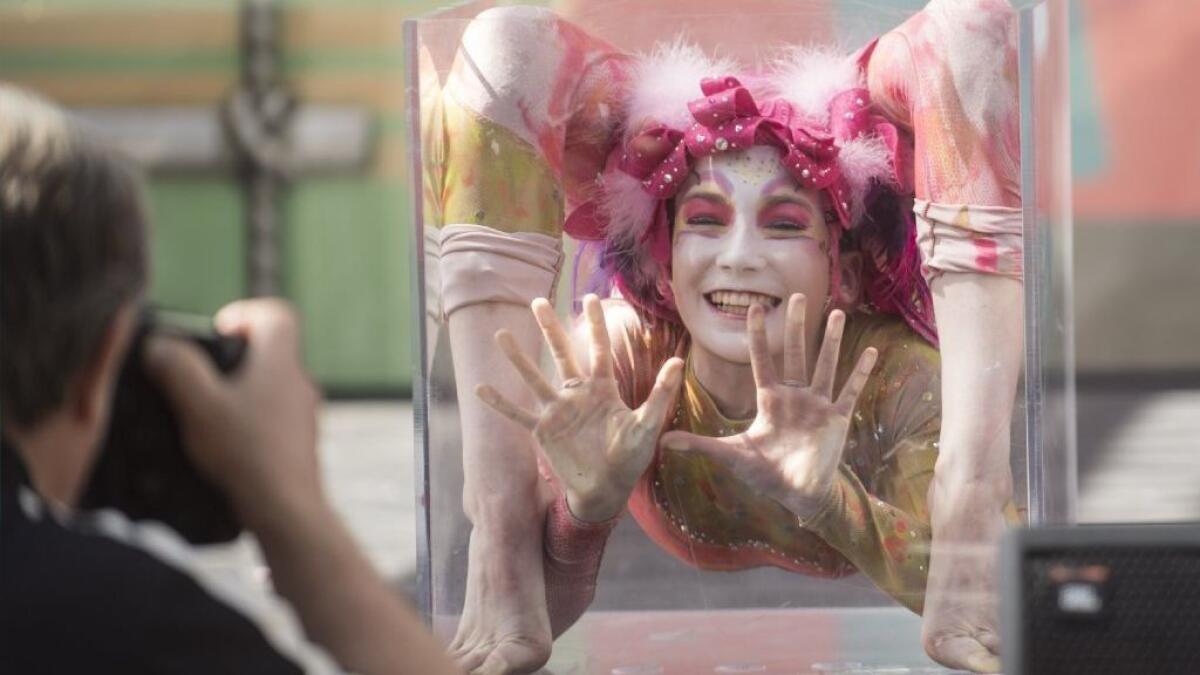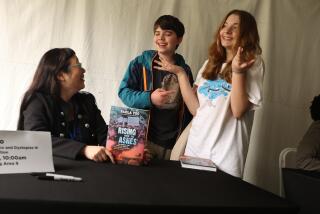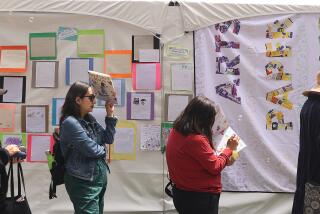Trump, immigration, dystopias are topics on last day of L.A. Times Festival of Books

After Donald Trump was elected president, Ben H. Winters put aside the novel he was writing in favor of a new project.
The result was “Golden State,” set in a society where every interaction is recorded and lying is severely punished.
Trump’s election was also the catalyst for some key essays in Bret Easton Ellis’ latest book, “White.”
A dean of Generation X novelists, Ellis turned to nonfiction to capture a reality he describes as overly puritanical and punitive against dissenters.
Winters and Ellis were among the speakers on the second and final day of the Los Angeles Times Festival of Books at USC.
The free festival, the largest of its kind in the country, was expected to draw about 150,000 people for the weekend — proof that fans of the written word remain plentiful in an era of streaming video, social media and a constant barrage of breaking news.
Despite the cancellations of high-profile novelists Joyce Carol Oates and Walter Mosley, there was a broad array of choices on Sunday, including a Spanish-language stage and a children’s stage. Panels explored subjects such as memoir writing and immigration, and former first daughter Chelsea Clinton discussed her children’s book on endangered animals.
At the vendor fair, publishers, authors and religious groups hawked wares ranging from $5 used paperbacks to books on herb gardens, Sufism and Buddhism. There was not an e-reader in sight.
Molly Green, a technical writer from Torrance, describes herself as a “giant bookworm” who reads about four books a month, mostly science fiction and nonfiction — all on paper.
“I stopped reading the news. I’d rather read a good book,” said Green, 22.
Bee Haskins, who was attending the festival with her father, Andy Haskins, said she tries to keep up with contemporary fiction, splitting her reading between physical books and audiobooks.
“It works a different part of my brain,” said Haskins, 23, who lives in Venice and edits promotions for network television. “You have to engage your mind a little more.”
In an interview with journalist Scott Timberg, Ellis said he was making his first public appearance in 10 years.
People who dislike Trump need to work toward defeating him in the next election and stop wallowing in their misery, Ellis said.
“People I knew kept breaking down — getting Trumped,” he said. “Why do you let him have that much power?”
In privileged, liberal circles, Ellis said, people with contrarian views are sometimes labeled as reactionaries or racists.
“There’s a political correctness, a puritanism sweeping over our culture that I don’t like,” Ellis said. “Unless you take a super-hard stance, you get labeled as a collaborator.”
Ellis’ critique of people who are emotionally overwrought by Trump’s actions has brought him a type of public scorn, fueled by social media, that was difficult to imagine when one of his seminal works, “American Psycho,” debuted in 1991.
That novel features a high-rolling Manhattan serial killer who worships none other than Donald Trump.
Trump figured prominently at another panel on Sunday, as former Secretary of Homeland Security Janet Napolitano critiqued the president’s immigration policies.
The Trump administration lacks an overall strategy for border security, she said. If she were in charge, she added, she would move every immigration judge to the border to quickly adjudicate asylum claims.
Her recent book is called “How Safe Are We? Homeland Security Since 9/11.”
“Building a wall is a symbol. It’s not a strategy,” she said in a discussion with Times Managing Editor Scott Kraft.
Napolitano is president of the University of California system. She said the college admissions scandal that has recently resulted in criminal charges against coaches, administrators and wealthy parents makes her “so angry.”
She said the UC is auditing its admissions practices, drilling down into problem areas and making sure “we’re turning square corners and have effective checks and balances.”
On the panel “Dystopian Fiction: It’s the End of the World As We Know It,” Winters was paired with Adam Nemett, whose debut novel “We Can Save Us All” is about Princeton University students caught up in a superhero cult as climate change wreaks havoc.
Nemett said he created the pre-apocalyptic world in his book, which is mostly like our world, by finding a “10% of conceit or a 10-degree shift I could add to the situation to make it similar yet different.”
At Nemett’s Princeton, there is a “time crisis” where each day is slightly shorter than 24 hours. Power blackouts last for weeks, and the students take psychedelics and performance-enhancing drugs.
Winters said the world in his book took shape organically, as the main character navigated his mission as an investigator of crimes against truth.
If a character is conducting an autopsy, for example, Winters asks himself: “What does that look like in this world? Who’s there? What does the room look like?”
Winters noted that dystopias sometimes emerge gradually, through “a slow dissolve of norms.”
That may include present-day America, he said.
“Oh wait, are we in a dystopia now? If one more thing happens, is that a dystopia?” Winters said.
More to Read
Sign up for Essential California
The most important California stories and recommendations in your inbox every morning.
You may occasionally receive promotional content from the Los Angeles Times.











